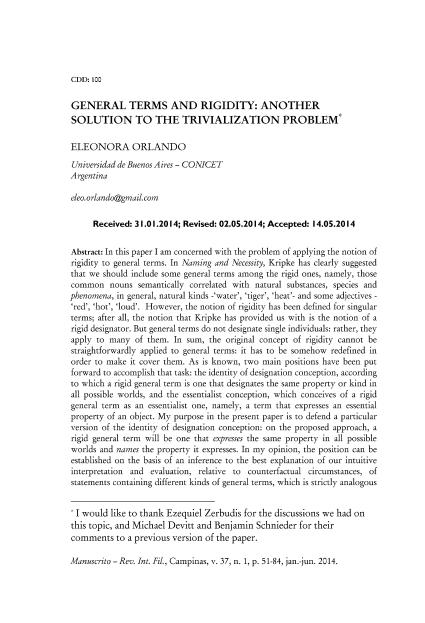Mostrar el registro sencillo del ítem
dc.contributor.author
Orlando, Eleonora Eva

dc.date.available
2018-02-07T19:05:17Z
dc.date.issued
2014-06
dc.identifier.citation
Orlando, Eleonora Eva; General terms and rigidity: another solution to the trivialization problem; Universidade Estadual de Campinas. Centro de Lógica, Epistemologia e História da Ciência; Manuscrito; 37; 1; 6-2014; 51-84
dc.identifier.issn
0100-6045
dc.identifier.uri
http://hdl.handle.net/11336/35992
dc.description.abstract
In this paper I am concerned with the problem of applying the notion of rigidity to general terms. In Naming and Necessity, Kripke has clearly suggested that we should include some general terms among the rigid ones, namely, those common nouns semantically correlated with natural substances, species and phenomena, in general, natural kinds -'water', 'tiger', 'heat'- and some adjectives -'red', 'hot', 'loud'. However, the notion of rigidity has been defined for singular terms; after all, the notion that Kripke has provided us with is the notion of a rigid designator. But general terms do not designate single individuals: rather, they apply to many of them. In sum, the original concept of rigidity cannot be straightforwardly applied to general terms: it has to be somehow redefined in order to make it cover them. As is known, two main positions have been put forward to accomplish that task: the identity of designation conception, according to which a rigid general term is one that designates the same property or kind in all possible worlds, and the essentialist conception, which conceives of a rigid general term as an essentialist one, namely, a term that expresses an essential property of an object. My purpose in the present paper is to defend a particular version of the identity of designation conception: on the proposed approach, a rigid general term will be one that expresses the same property in all possible worlds and names the property it expresses. In my opinion, the position can be established on the basis of an inference to the best explanation of our intuitive interpretation and evaluation, relative to counterfactual circumstances, of statements containing different kinds of general terms, which is strictly analogous to our intuitive interpretation and evaluation, relative to such circumstances, of statements containing different kinds of singular ones. I will argue that it is possible to offer a new solution to the trivialization problem that is thought to threaten all versions of the identity of designation conception of rigidity. Finally, I will also sketch a solution to the so-called 'over-generalization and under-generalization problems', both closely related to the above-mentioned one.
dc.format
application/pdf
dc.language.iso
eng
dc.publisher
Universidade Estadual de Campinas. Centro de Lógica, Epistemologia e História da Ciência
dc.rights
info:eu-repo/semantics/openAccess
dc.rights.uri
https://creativecommons.org/licenses/by-nc-sa/2.5/ar/
dc.subject
Términos Generales
dc.subject
Designación Rígida
dc.subject
Mundos Posibles
dc.subject
Problema de La Trivialización
dc.subject.classification
Estudios Religiosos

dc.subject.classification
Filosofía, Ética y Religión

dc.subject.classification
HUMANIDADES

dc.title
General terms and rigidity: another solution to the trivialization problem
dc.type
info:eu-repo/semantics/article
dc.type
info:ar-repo/semantics/artículo
dc.type
info:eu-repo/semantics/publishedVersion
dc.date.updated
2018-02-07T17:27:34Z
dc.identifier.eissn
2317-630X
dc.journal.volume
37
dc.journal.number
1
dc.journal.pagination
51-84
dc.journal.pais
Brasil

dc.journal.ciudad
Campinas
dc.description.fil
Fil: Orlando, Eleonora Eva. Universidad de Buenos Aires. Facultad de Filosofía y Letras. Departamento de Filosofía; Argentina. Consejo Nacional de Investigaciones Científicas y Técnicas; Argentina
dc.journal.title
Manuscrito

dc.relation.alternativeid
info:eu-repo/semantics/altIdentifier/url/https://periodicos.sbu.unicamp.br/ojs/index.php/manuscrito/article/view/8641964
dc.relation.alternativeid
info:eu-repo/semantics/altIdentifier/url/http://ref.scielo.org/jnks64
dc.relation.alternativeid
info:eu-repo/semantics/altIdentifier/doi/http://dx.doi.org/10.1590/S0100-60452014000100002
Archivos asociados
